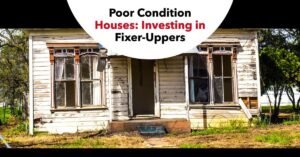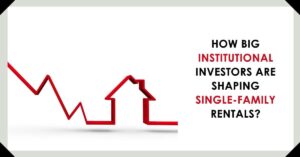The itch to jump into real estate investing is there, but headlines scream rising interest rates and inflation. Maybe you've seen whispers of a potential crash. Should you wait or buy? Here's the truth: there's no perfect time, and right now could be an excellent opportunity. So, forget scary headlines! Real estate investing can thrive in any market. Let's break it down.
Here's Why You Should Invest in Real Estate Today
While there's no crystal ball, let's delve into the trends suggesting 2024 might be a great time to jump into the real estate market.
Why Market Swings Can Be Your Ally
Market downturns are often painted as scary times for investors, but for those in the know, they can be a goldmine. The media tends to focus on the overall housing market, which can be different for everyday people buying homes versus seasoned investors. We focus on a specific niche: helping folks in tough situations.
Life throws curveballs – divorce, health issues, job loss, you name it. These situations create a need to sell a property quickly, and that's where we step in. These situations happen all the time, regardless of the economic climate. People will always need the kind of help we provide as investors.
Seize the Moment
So, if you've been on the fence, here's the nudge you've been waiting for. Jump in! The current political climate, media narratives, or even the weather shouldn't hold you back. In my experience, most people who ask “Is now the right time?” are unconsciously looking for a reason to delay.
What truly matters is having a solid system in place, a roadmap to guide your investment journey. We don't just get you started; we're here for the long haul, offering support throughout your investing life. Nervous about your first deal? We'll partner with you, so you don't go it alone.
Consider turnkey real estate investing as an easy entry point. Turnkey properties are pre-renovated and pre-managed investment properties, allowing you to invest in real estate without the hassle of renovations or tenant management.
This hands-off approach is a great way to get started, learn the ropes, and build your portfolio without the day-to-day management responsibilities. Norada Real Estate Investments offers turnkey properties in more than 20 growing real estate markets across the country, so you can invest in a location that aligns with your goals.
A Potential Shift in Interest Rates
One of the biggest factors impacting affordability is mortgage rates. While they reached historic highs in 2023, experts predict a decline in 2024. This translates to lower monthly payments, potentially opening the door for more buyers and increasing competition for properties. However, the decline might be gradual, so acting sooner could allow you to secure a better rate.
Market Dynamics: A Balancing Act
The housing market in 2023 saw a slowdown due to high interest rates. This, however, led to a decrease in available properties as sellers opted to hold onto their lower-rate mortgages. This limited supply, coupled with a growing population and increasing urbanization, could lead to continued demand in 2024. This scenario might benefit investors seeking stable or appreciating property values.
Emerging Trends
The real estate landscape is constantly evolving. 2024 might see a rise in popularity for sustainable or “green” buildings that cater to eco-conscious buyers and renters. Additionally, the concept of “smart cities” – urban areas integrated with technology – could influence property values in specific locations. Being aware of these trends can help you identify potentially lucrative investment opportunities.
Remember: It's All About Location
National trends offer a broad perspective, but real estate is hyper-local. While the overall market might be promising, success hinges on choosing the right property in the right area. Research demographics, job markets, and local development plans to find areas poised for growth or consistent demand.
Investing for the Long Term
While 2024 might present favorable conditions, real estate is a long-term game. Don't get caught up in the frenzy of a hot market. Focus on properties with strong fundamentals, a solid rental market, and the potential for appreciation over time.
While 2024 has the potential to be a good year for real estate investment, remember, it's not without its risks. Carefully consider your financial situation, risk tolerance, and investment goals. Consulting a financial advisor experienced in real estate can provide valuable guidance.
Conclusion: Investing in Knowledge, Investing in You
With a potential decline in interest rates, a balancing market, and emerging trends, 2024 could be a promising time for real estate investment. However, thorough research, a focus on location, and a long-term perspective are crucial for success. By carefully weighing the opportunities and risks, you can position yourself to make informed decisions and potentially reap the rewards of a thriving real estate market.
Think of this as an investment in yourself and your future. The knowledge and guidance you gain now can pave the way for financial security and freedom. Imagine the peace of mind that comes with knowing you have a reliable stream of income, generated by your real estate investments.
Financial freedom opens doors to countless possibilities. Maybe it's traveling the world, spending more time with family, or pursuing passions you've always had on the back burner. Real estate investing can be the key that unlocks those dreams. We're here to help you get started on the path to financial freedom.
Let's chat about how we can tailor a plan to your unique goals and risk tolerance.
ALSO READ:
The Important Tax Benefits of Real Estate Investing
18 Best Real Estate Investing Books For Beginners (2024)
10 Tips to Be Successful in Real Estate Investing (2024)
Risks of Real Estate Investing: What You Can Do About Them?
What is Passive Real Estate Investing?
Housing Market Predictions for Next 5 Years (2024-2028)
Real Estate Forecast for the Next 5 Years: Future Predictions?
Mortgage Rate Predictions for Next 5 Years
Mortgage Rate Predictions for the Next 2 Years
Mortgage Rate Predictions for Next 3 Years: Double Digit Rise










